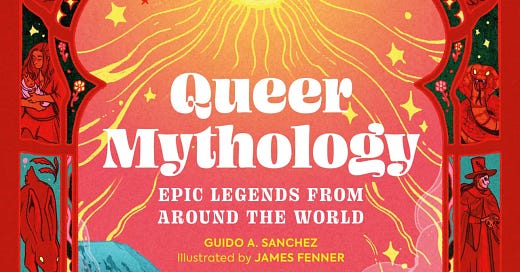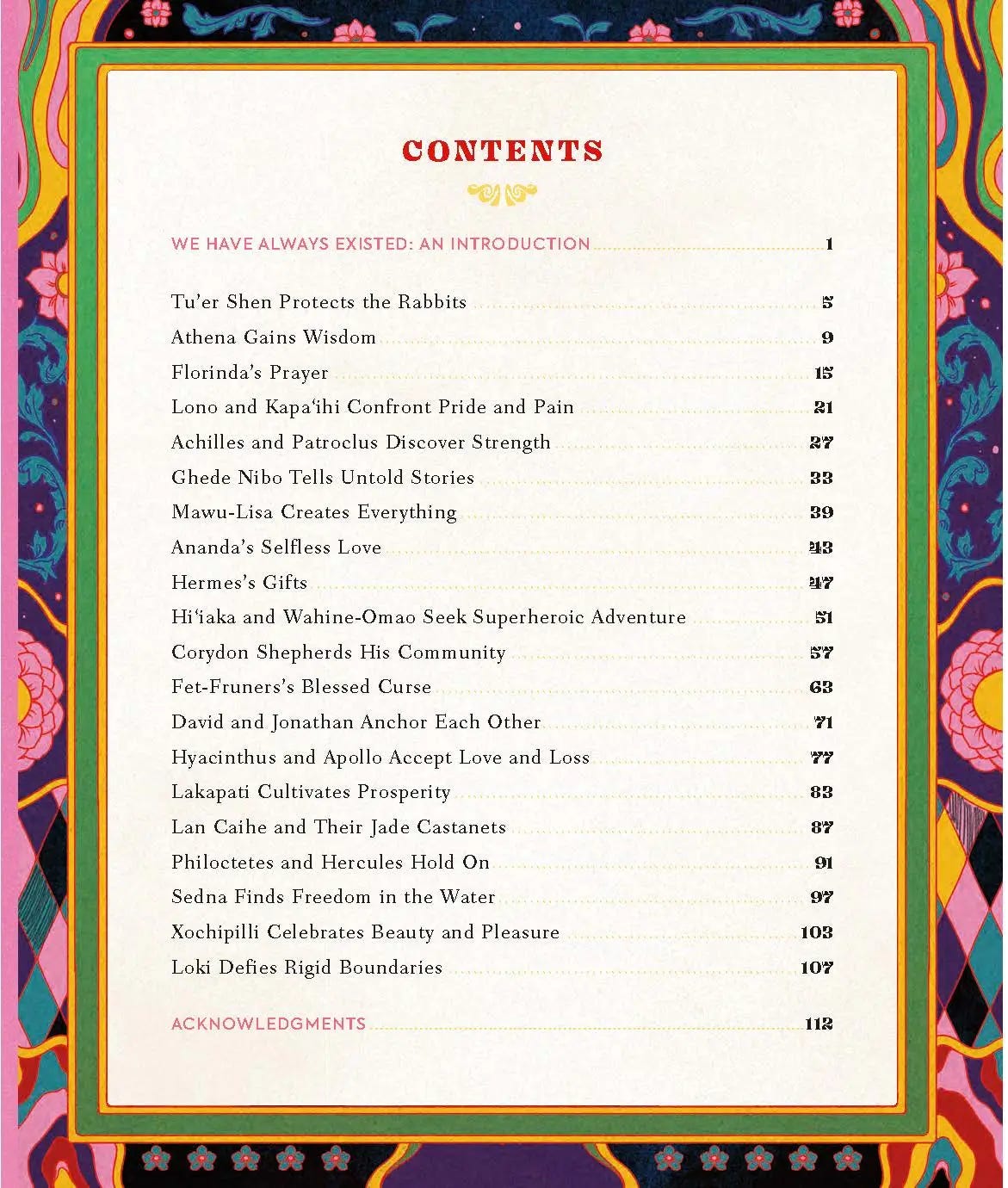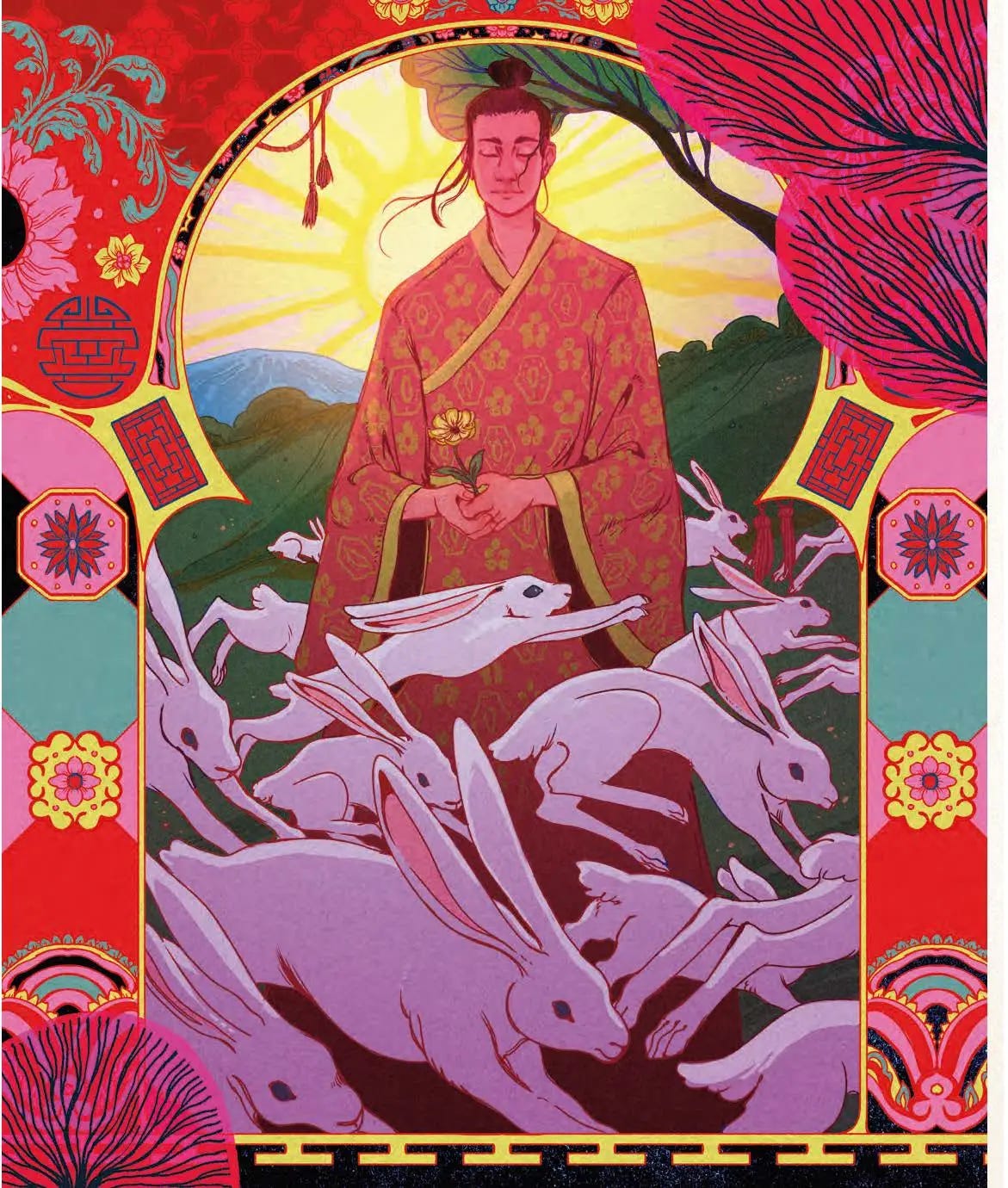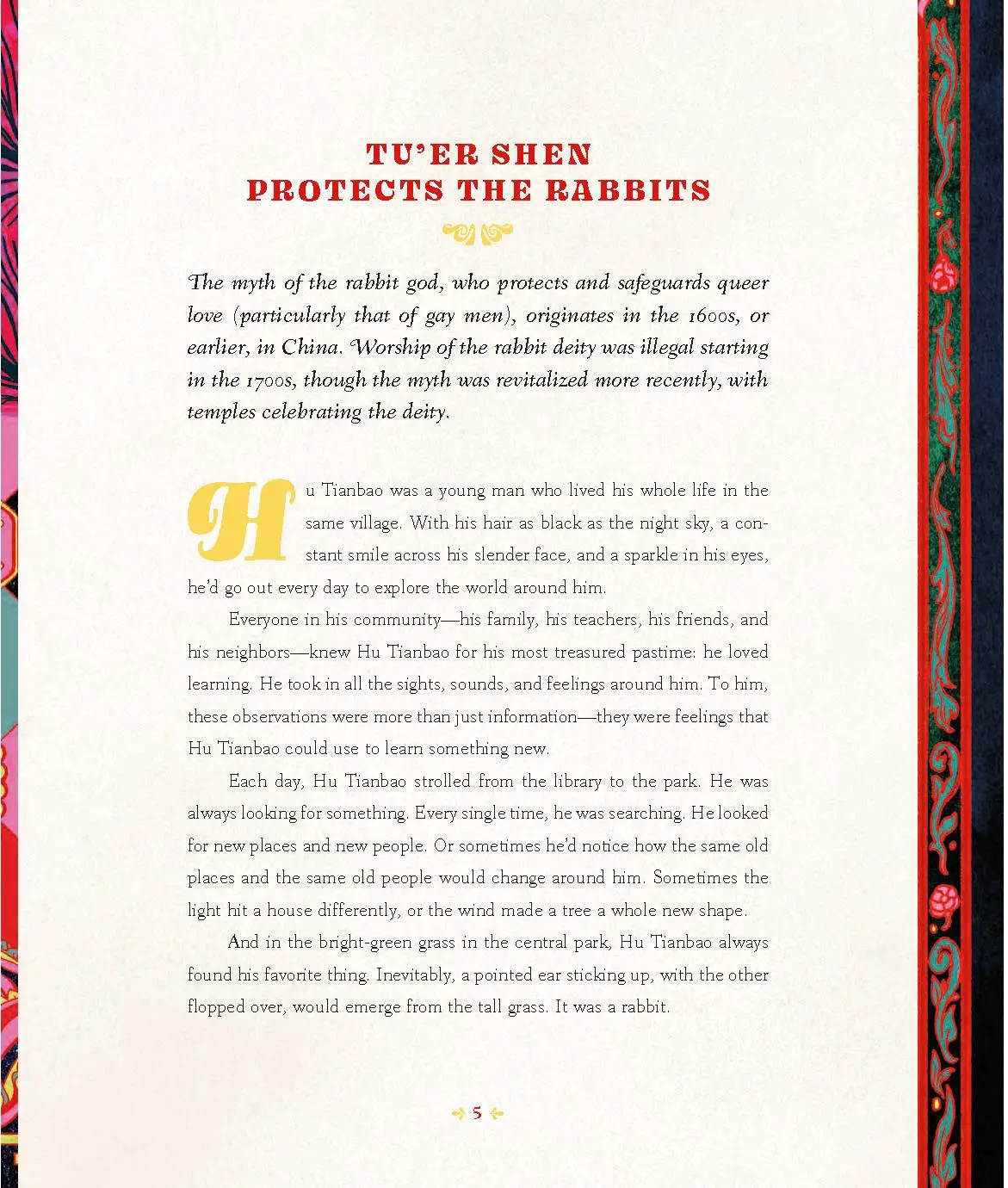I am thrilled to begin the countdown to my first major book release, Queer Mythology, available one month from today through Running Press! This project is incredibly special to me, and I wrote it with the hope that it will resonate deeply with readers of all ages, cultures, & identities. It’s a collection that celebrates the richness of human diversity, and I’m so excited for you all to experience it.
Stay tuned for more details, as I have at least four book events planned for this Fall and Winter. I’ll be sharing the full schedule and announcements soon!
Queer Mythology includes twenty stories that are as diverse as humanity itself. Some of these tales are literally thousands of years old, stretching back into the depths of history, while others were only recorded in the last two centuries. They span six continents and represent an infinite spectrum of gender and sexual identities, illustrating both the differences and the shared experiences across cultures and time.
The stories in this collection vary widely—from adventures and love stories to tales that explore our sense of self and our place in the world. There’s drama, action, romance, intrigue, mystery, science fiction, the supernatural, and horror, all woven together with themes that speak to our shared human experiences. These stories are rich with morals, messages, and meanings that I hope readers will continue to uncover over time.
In the book’s introduction, titled "We Have Always Existed," I delve into the universality of these tales and the connections that tie us all together. Each story in the collection holds a special place in my heart, anchored by a universal essence I found in the original story that I believe can resonate with anyone. As a special teaser, I want to share the opening story of the book, the tale of Tu’er Shen. This story, with its gentle nature and vivid imagery, stands out to me not just for its beauty, but for its powerful message that through even the darkest tragedy, supporting and caring for one another is the most important thing we can do—a theme that echoes throughout the collection.
I hope you enjoy this glimpse into Queer Mythology and that it sparks your interest to explore the rest of the stories. Don’t forget, you can pre-order the book now, either for yourself or as a gift for someone special.
Thank you for your continued support, and I look forward to sharing more with you soon!
Tu’er Shen Protects the Rabbits
Hu Tianbao was a young man who lived his whole life in the same village. With his hair as black as the night sky, a constant smile across his slender face, and a sparkle in his eyes, he’d go out every day to explore the world around him.
Everyone in his community—his family, his teachers, his friends, and his neighbors—knew Hu Tianbao for his most treasured pastime: he loved learning. He took in all the sights, sounds, and feelings around him. To him, these observations were more than just information—they were feelings that Hu Tianbao could use to learn something new.
Each day, Hu Tianbao strolled from the library to the park. He was always looking for something. Every single time, he was searching. He looked for new places and new people. Or sometimes he’d notice how the same old places and the same old people would change around him. Sometimes the light hit a house differently, or the wind made a tree a whole new shape.
And in the bright-green grass in the central park, Hu Tianbao always found his favorite thing. At some point, a pointed ear sticking up, with the other flopped over, would emerge from the tall grass. It was a rabbit.
Hu Tianbao watched as many bright-white rabbits hopped up and down the hill—small rabbits, large rabbits, rabbits of all sizes. Some kept to themselves, while others huddled together. Some were still, staring around or wiggling their nose as they munched on some tiny shreds of grass. Others were actively hopping from place to place, dotting the hill as they moved about. Hu Tianbao’s curious mind flitted like these rabbits—moving from rabbit to rabbit, idea to idea, place to place, person to person.
“Why do you like watching the rabbits so much, Hu Tianbao?” his friends would ask.
“They are agile, they are cunning, and they are friendly,” he answered.
“But why is it that they fascinate you with their agility and their cunning?” they’d reply.
“They keep themselves safe. These beautiful, kind creatures in their quick movements are almost always free from danger. And their crafty, clever ways keep them and their families—even the rabbits that are not their relatives—all protected.”
One day, as Hu Tianbao left the library to head to the park, he noticed something different emerge in his view: a visitor making regular stops in the village. The visitor was an inspector wearing a drab dark-blue uniform and carrying around a plain black satchel for his papers. Each week he visited to examine different parts of the village, then report back to the emperor.
Hu Tianbao became fascinated with what the inspector was learning during his trips. “What could I learn from him about the village?” he wondered. So Hu Tianbao sought out the inspector on each of his visits. And just as he found the white rabbits bouncing up the hill, he began to see this man bouncing around the neighborhoods, albeit with smaller ears. And he began to see the inspector as beautiful. He began to care for him, from afar, and wonder more about him.
Hu Tianbao found the inspector intriguing and attractive. He needed to learn everything about him he could. Every time the inspector—with his mesmerizing dark eyes and sharp, square jaw—came to visit, Hu Tianbao felt more jitters.
The feeling—the “jitters”—was the flutter of love growing inside him. His attraction grew and grew. His stomach felt like the pitter-patter of rabbits’ feet hopping all over. And Hu Tianbao loved the feeling.
One day, while Hu Tianbao was watching the bunnies flitting around the green hills they so loved, he lost track of the inspector. But this time, the inspector had noticed Hu Tianbao, and he approached him with a scowl.
“Who are you and why do you watch me so?” asked the inspector.
“You fascinate me,” replied Hu Tianbao.
“Why?” the cold, stern man demanded.
“You love learning and investigating, as do I. I feel lucky to have met you almost like I have a lucky rabbit’s foot, which I would never have because rabbits need their feet. And when I see you, I get these feelings—” continued Hu Tianbao.
The inspector cut him off and went back to the central city, far, far away from Hu Tianbao’s village. The next day Hu Tianbao was arrested. The inspector had alerted the city officials to this exchange. At this time, in this place, these feelings were not allowed to be shared. Hu Tianbao was sentenced to death for his feelings. Even Hu Tianbao could not understand why this was happening. This situation was fueled by the one thing beyond his learning: hate.
Hu Tianbao was tragically killed because of his feelings. As his spirit descended to the underworld, Hu Tianbao was sure his story was not over. He knew that his time learning, exploring, caring, and protecting could not be over.
The underworld was abuzz upon Hu Tianbao’s arrival. The other spirits—the ones who had been there the longest—had gathered. This council of the underworld nicknamed Hu Tianbao “Rabbit” because they knew of his curiosity. They saw his agility and understood the pitter-patter of love he experienced.
“Rabbit,” they said, “you think you do not belong here. Why is that?”
“It was for my love that my life was taken, and it is for love that I will continue to fight,” said Hu Tianbao.
The other spirits were confused. People weren’t supposed to arrive in the underworld wishing to live. The spirits also worried about an injustice; no one was supposed to die in this manner.
“We can fix this,” said one.
“We have to repair this,” said another.
“Rabbit has more to do.”
“He can protect others.”
Suddenly, far away from the village Hu Tianbao lived and died in, a young villager had a peculiar dream. The young villager, a teenager, had just begun to feel his own jitters when he was with a friend at school. In his dream, he saw a rabbit. The rabbit was a beautiful white creature, with a sparkle in his eyes, hopping along a green hill. It was Hu Tianbao, or Tu’er Shen, the rabbit god, as the spirits called him now.
“I will protect you,” said Tu’er Shen in the young villager’s dream. “I will protect your love. Live in the world as you are. Fall in love and feel love. I will protect your affections. Know that I am here for you.”
Since that dream occurred, anyone who felt affection of a queer nature could call upon Tu’er Shen. As the rabbits used their speed, agility, and cunning to protect themselves and one another from danger, Tu’er Shen would protect those who felt a love that was not accepted in the world.







This is a beautiful text about Hu Tianbao/Tu'er Shen, but it is a shame that the myth has been distorted at several points:
- Hu Tianbao was called "Rabbit" because he was a man who loved men, as "Rabbit" is an old Chinese slang term for them, not because he had any personal interest in the animal.
- He was a soldier, a warrior, not a bon vivant as the text suggests.
- It also does not say that he liked to secretly watch the officer bathe naked.
- He was not only sentenced to death; he was also tortured before being killed.
- And he appeared in a dream to a village elder in Fujian (location not given in the text), not to a boy in love with his schoolmate. It was this elder who gathered other men from the village to build the first temple of Tu'er Shen.
The distortion of some details and the ignoring of others shows that the research into the myth of this god was not done carefully.